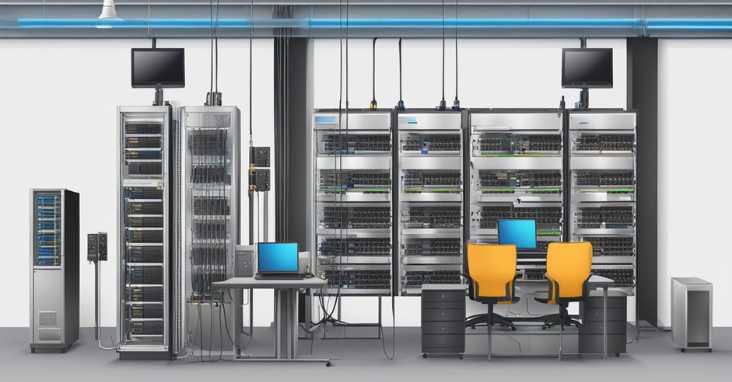What is small business IT support ? Small business IT support ensures tech systems work efficiently, offering troubleshooting, maintenance, and software management.
Small businesses often struggle to keep up with the rapidly evolving world of technology. While larger corporations can afford to have their own in-house IT teams, small businesses often lack the resources to do so. This is where small business IT support comes in. IT support providers offer a range of services to help small businesses manage their technology needs, from network setup and support to cybersecurity and cloud computing.

Understanding Small Business IT Support
Small business IT support refers to the services provided by IT professionals to help small businesses manage their technology needs. These services can range from basic troubleshooting to more complex tasks such as network setup and support. IT support providers can help small businesses evaluate their IT needs and provide customized solutions to meet those needs.
Key Takeaways
- Small business IT support provides a range of services to help small businesses manage their technology needs.
- Small business IT support providers can help evaluate their IT needs and provide customized solutions to meet those needs.
- Small businesses can benefit from outsourcing their IT support needs to a professional provider.
Link to external resource
Understanding Small Business IT Support
Small businesses have unique technology needs that must be met to ensure smooth operations and growth. IT support services are essential for small businesses to manage their technology needs effectively. In this section, we will define IT support and services, discuss the importance of small business IT support for growth, and explore the different types of IT support models.
Defining IT Support and Services
IT support refers to the services provided to businesses to manage their technology needs. These services include hardware and software maintenance, network management, security, data backup and recovery, and help desk support. IT services are designed to ensure that businesses can use technology to achieve their goals.
The Importance of Small Business IT Support for Growth
Small businesses rely heavily on technology to compete with larger businesses. Small business IT support services are critical to keep up with technology trends, maintain their systems, and ensure that they are secure. Managed small business IT services offer access to a team of experts who can manage their technology needs at an affordable price. With the right IT support, small businesses can focus on growth and innovation.
Types of IT Support Models
There are several types of small business IT support models available. The most common models include break-fix, managed services, and co-managed services. Break-fix services are reactive and are only used when a problem occurs. Managed IT services are proactive and provide ongoing support to prevent problems from occurring. Co-managed services are a hybrid of break-fix and managed services, where the business and IT provider work together to manage the technology needs.
Small businesses must choose the right IT support model based on their needs and budget. They should also consider the level of expertise and experience of the IT provider. It is essential to work with a reputable IT provider that has experience working with small businesses.
In conclusion, small business IT support services are crucial to manage their technology needs effectively. With the right IT support, small businesses can focus on growth and innovation. Small businesses should choose the right IT support model based on their needs and budget and work with a reputable IT provider. For more information on IT support services for small businesses, visit this link.
Evaluating Your Small Business IT Support Needs

Small business IT support challenges are often faced due to limited resources and expertise. However, with the right IT solutions, small businesses can improve their productivity and stay competitive in the market. Evaluating your small business IT needs is the first step towards achieving this goal.
Assessing Your Current IT Infrastructure
Before identifying technology gaps and opportunities, it is important to assess the current small business IT support infrastructure. This includes hardware, software, network, and security systems. By evaluating the current IT infrastructure, small businesses can identify areas that need improvement and determine the resources required for upgrading.
Identifying Technology Gaps and Opportunities
After assessing the current small business IT support infrastructure, small businesses can identify technology gaps and opportunities. Technology gaps refer to areas where the current IT infrastructure is lacking or outdated. Technology opportunities refer to areas where new technology can be implemented to improve business operations.
Creating a Customized IT Plan
Once technology gaps and opportunities have been identified, small businesses can create a customized IT plan. This plan should be tailored to the specific needs of the business and take into account budget, resources, and future growth. A customized IT plan can help small businesses optimize their IT infrastructure and improve productivity.
Small businesses can benefit from seeking the advice of IT professionals to help evaluate their IT needs. IT solutions providers such as TechRepublic offer resources and expertise to help small business IT support infrastructure improvement.
Managed Small Business IT Support Services
Small businesses often struggle to keep up with the ever-changing world of technology. They may not have the resources or expertise to manage their IT infrastructure effectively. This is where managed IT services come in. Managed IT services are a type of outsourced IT support where a third-party provider takes care of a company’s IT needs.
Benefits of Managed IT Services
Managed small business IT support services offer several benefits to small businesses. First and foremost, they provide access to a team of IT professionals with a wide range of skills and expertise. This team can handle everything from basic IT support to complex projects like network design and implementation.
Another benefit of managed small business IT support services is that they can help small businesses save money. Instead of hiring an in-house IT team, which can be expensive, small businesses can outsource their IT needs to a managed IT service provider. This can help them reduce their IT costs while still getting the support they need.
Selecting a Managed IT Service Provider
When selecting a managed small business IT support service provider, there are several factors to consider. One of the most important is the provider’s experience and expertise. Small businesses should look for a provider that has experience working with companies of their size and in their industry.
Another factor to consider is the provider’s pricing model. Some providers charge a flat fee for their services, while others charge based on the services provided. Small businesses should choose a pricing model that works best for their budget and needs.
Managed Services vs. In-House IT Support
Managed small business IT support services offer several advantages over in-house IT support. One of the biggest advantages is that managed IT services provide access to a team of IT professionals with a wide range of skills and expertise. In-house IT teams may not have the same level of expertise or experience.
Another advantage of managed IT services is that they can help small businesses save money. In-house IT teams can be expensive to hire and maintain, while managed IT services provide a cost-effective alternative.
Overall, managed small business IT support services can be a valuable asset for small businesses. They provide access to a team of IT professionals with a wide range of skills and expertise, while also helping small businesses save money. Small businesses should carefully consider their options when selecting a managed IT service provider, taking into account factors like experience, pricing, and expertise.
Here is a list of some of the best managed small business IT support service providers.
Cybersecurity for Small Businesses
Small businesses are just as vulnerable to cyber attacks as large corporations. In fact, they are often targeted more frequently because they tend to have weaker security measures in place. A single cyber attack can be devastating for a small business, leading to loss of data, financial losses, and damage to reputation. Therefore, small businesses must take cybersecurity seriously and implement effective measures to protect themselves.
Understanding Cybersecurity Risks
The first step in protecting a small business from cyber threats is to understand the risks involved. Cybersecurity risks include phishing attacks, malware, ransomware, and social engineering. Small businesses must be aware of these risks and take steps to mitigate them. This includes training employees to recognize and avoid phishing emails, installing anti-malware software, and implementing strong password policies.
Implementing Effective Cybersecurity Measures
Small businesses can implement a variety of cybersecurity measures to protect themselves. These include using firewalls, encrypting data, and restricting access to sensitive information. It is also important to keep software up to date and to regularly backup data. Small businesses can also consider outsourcing their cybersecurity needs to a reputable cybersecurity service provider.
Regular Cybersecurity Assessments and Penetration Testing
Small businesses should also conduct regular cybersecurity assessments and penetration testing to identify potential vulnerabilities in their systems. This can help them to proactively address any weaknesses before they are exploited by cyber criminals. Penetration testing involves simulating a cyber attack to identify any weaknesses in the system. Small businesses can hire a cybersecurity service provider to conduct these assessments and tests.
It is important for small businesses to take cybersecurity seriously and to implement effective measures to protect themselves. By understanding the risks, implementing effective measures, and conducting regular assessments and testing, small businesses can reduce their risk of falling victim to a cyber attack.
For more information on cybersecurity for small businesses, visit The National Cyber Security Alliance.
Network Setup and Support

Small businesses rely heavily on their computer networks to communicate, collaborate, and store data. Therefore, having a well-designed and maintained network is crucial for the success of any small business. In this section, we will discuss the key aspects of network setup and support that are essential for small businesses.
Designing a Robust Small Business Network
Designing a robust network infrastructure is the first step in ensuring a reliable and secure network. Small businesses need to consider the following factors when designing their network:
- Bandwidth requirements: Small businesses should determine their bandwidth requirements based on the number of users, the type of applications they use, and the amount of data they transfer.
- Network topology: Small businesses should choose the right network topology that suits their needs. Common network topologies include star, bus, ring, and mesh.
- Network security: Small businesses should implement security measures such as firewalls, antivirus software, and intrusion detection systems to protect their network from cyber threats.
- Scalability: Small businesses should design their network to be scalable, so it can grow as the business expands.
Network Support and Maintenance
Network support and maintenance are critical to ensure that the network runs smoothly and is available when needed. Small businesses should consider the following aspects of network support and maintenance:
- Network monitoring: Small businesses should monitor their network to detect and resolve issues before they become major problems.
- Network upgrades: Small businesses should upgrade their network hardware and software regularly to keep up with the latest technology and security standards.
- Network documentation: Small businesses should document their network setup and configuration to facilitate troubleshooting and maintenance.
- Network training: Small businesses should provide training to their employees to ensure they understand how to use the network effectively and securely.
Data Backup and Disaster Recovery Planning
Data backup and disaster recovery planning are essential to ensure that small businesses can recover from data loss or network downtime. Small businesses should consider the following aspects of data backup and disaster recovery planning:
- Data backup: Small businesses should back up their data regularly to protect against data loss due to hardware failure, theft, or cyber attacks.
- Disaster recovery planning: Small businesses should have a disaster recovery plan in place to ensure that they can recover from network downtime or data loss quickly.
- Testing: Small businesses should test their disaster recovery plan regularly to ensure that it works effectively.
Small businesses can benefit from seeking professional small business IT support to design, implement, and maintain their network infrastructure. A reliable small business IT support provider can help small businesses save time and money while ensuring that their network is secure and available when needed.
Here is a resource from Cisco that provides more information on designing and deploying small business networks.
Cloud Computing for Small Businesses

Small businesses often struggle with managing their IT resources due to limited budgets and staff. Cloud computing offers a cost-effective solution to this problem by providing access to a wide range of resources and services over the internet. In this section, we will explore how small businesses can leverage cloud services to enhance their IT capabilities.
Leveraging Cloud Services
Cloud computing provides small businesses with a range of services, including storage, computing power, and software applications. By using these services, small businesses can reduce their IT costs, improve their efficiency, and enhance their flexibility. For example, cloud-based storage solutions can eliminate the need for expensive hardware and maintenance, while cloud-based software applications can provide access to the latest tools and technologies without the need for expensive licenses.
Cloud Security and Compliance
One of the main concerns for small businesses when it comes to cloud computing is security. However, cloud providers often have robust security measures in place to protect their customers’ data. Small businesses can also take steps to ensure their data is secure by implementing strong passwords, limiting access to sensitive information, and regularly monitoring their systems.
Another concern for small businesses is compliance with regulations such as GDPR and HIPAA. Cloud providers can help small businesses meet these requirements by offering compliant services and providing the necessary documentation and certifications.
Integrating Cloud Computing with Existing IT Resources
Small businesses may already have existing IT resources in place, such as on-premises servers or software applications. Cloud computing can be integrated with these resources to create a hybrid environment that provides the best of both worlds. For example, a small business could use cloud-based storage for backup and disaster recovery while using on-premises servers for day-to-day operations.
Overall, cloud computing offers numerous benefits for small businesses looking to enhance their IT capabilities. By leveraging cloud services, small businesses can reduce their IT costs, improve their efficiency, and enhance their flexibility. To learn more about cloud computing for small businesses, check out this link to an external resource with high authority on the topic.
IT Support Resources and Training

Small businesses rely heavily on their IT systems to operate efficiently and effectively. However, with limited resources and a small team, it can be challenging to keep up with the latest trends and technology. This is where small business IT support resources and training come in.
Providing Resources for Ongoing Employee Training
Small businesses need to invest in their employees’ IT training to ensure they are equipped with the necessary skills to handle IT-related issues that may arise. Providing resources for ongoing employee training, such as online courses, webinars, and workshops, can help employees stay up-to-date with the latest technology and trends.
One excellent resource for ongoing employee training is LinkedIn Learning, which offers a wide range of IT-related courses. LinkedIn Learning provides a convenient and flexible way for employees to learn at their own pace, and the courses are taught by experts in the field.
Access to Expert IT Support and Help Desk Services
Small businesses may not have the resources to hire a full-time IT specialist, but they still need access to expert IT support and help desk services. Outsourcing IT support services can be a cost-effective solution for small businesses.
One such company that offers expert small business IT support and help desk services is IT Support Guys. They provide comprehensive small business IT support services, including 24/7 help desk support, network management, and cybersecurity solutions. They also offer a range of customizable IT support plans to fit every small business’s needs.
Utilizing Webinars and Online Guides for Self-Help
Small businesses can also utilize webinars and online guides for self-help when it comes to IT-related issues. These resources can provide step-by-step instructions for common IT issues, such as setting up a new printer or troubleshooting network connectivity issues.
One such resource for self-help is the Microsoft Support website, which provides a wide range of articles, videos, and tutorials on various IT-related topics. The website is easy to navigate, and the information is presented in an easy-to-understand format.
In conclusion, small businesses IT support needs to be invested in, resources and training to ensure they can operate efficiently and effectively. By providing ongoing employee training, access to expert IT support and help desk services, and utilizing webinars and online guides for self-help, small businesses can stay up-to-date with the latest technology and trends.
Pricing and Budgeting for IT Support

Understanding IT Support Costs
When it comes to small business IT support, pricing can vary widely depending on the services needed. Some companies charge hourly, while others offer flat-rate packages. It’s important to understand the costs associated with each option and choose the one that best fits the needs and budget of the business.
Hourly rates can range from $75 to $200 per hour, depending on the level of expertise required. Flat-rate packages can start at $100 per month and go up to $500 per month or more, depending on the services included.
It’s also important to consider any additional costs, such as hardware upgrades or software licensing fees. These costs can add up quickly, so it’s important to have a clear understanding of what is included in the small business IT support package.
Budgeting for IT Services
small business IT support should budget just like any other business expense. A good rule of thumb is to allocate 2-3% of the company’s revenue towards IT support. For example, a business with $500,000 in annual revenue should budget $10,000 to $15,000 per year for IT support.
It’s important to prioritize small business IT support within the budget, as it can have a significant impact on the overall success of the business. Cutting corners on small business IT support can lead to costly downtime, security breaches, and lost productivity.
Exploring Funding and Financial Assistance
Small businesses may be eligible for financial assistance through the Small Business Administration (SBA) or the Paycheck Protection Program (PPP). These programs can help cover the costs of small business IT support services, as well as other business expenses.
The SBA offers a variety of loan programs, including the Economic Injury Disaster Loan (EIDL) and the 7(a) Loan Program. These loans can be used to cover a wide range of business expenses, including IT support services.
The PPP provides forgivable loans to small businesses to help cover payroll and other expenses, including IT support services. The program has been extended through 2021, so small businesses should consider applying if they need financial assistance.
Overall, small business IT support should be prioritized within their budget and choose a pricing model that fits their needs and budget. Exploring funding and financial assistance options can also help cover the costs of IT support services.
Staying Informed: IT Support Updates and Trends

Small businesses rely on technology to remain competitive and efficient. However, with the constant evolution of technology, it can be challenging to keep up with the latest trends and security updates. This section will provide insights into how small business IT support can stay informed on updates and trends.
Keeping Up with Technology and Security Updates
Staying informed about technology and security updates is crucial for small businesses to protect their data and systems from cyber threats. It is essential to stay up-to-date with the latest security patches and software updates to ensure that the business’s critical data is protected.
Small businesses can stay informed about technology and security updates by subscribing to newsletters, following industry experts on social media, and attending industry conferences. The U.S. Small Business Administration (SBA) website, sba.gov/coronavirus, is an excellent resource for small businesses to stay informed about the latest technology and security updates related to the coronavirus pandemic.
Adapting to Changes in IT Support Needs During a Pandemic
The coronavirus pandemic has forced small businesses to adapt to new ways of working, including remote work. As a result, IT support needs have changed, and small businesses need to adapt to these changes to ensure that their systems and data remain secure.
small business IT support can adapt to changes by investing in cloud-based solutions, implementing remote access policies, and providing training to employees on how to work securely from home. The SBA website, sba.gov/coronavirus, provides resources and guidance for small businesses on how to adapt to changes in IT support needs during the pandemic.
In conclusion, staying informed about IT support updates and trends is crucial for small businesses to remain competitive and secure. By keeping up-to-date with the latest technology and security updates and adapting to changes in small business IT support needs during the pandemic, small businesses can ensure that their systems and data remain secure.
Frequently Asked Questions

What are the typical costs associated with small business IT support?
The costs associated with IT support for small businesses vary widely depending on the level of support required. Basic support services such as software updates, antivirus protection, and network monitoring can cost between $50 and $150 per user per month. More comprehensive support, including help desk services, data backup and recovery, and cybersecurity, can cost $200 or more per user per month. Other factors that can affect the cost include the size of the business, the complexity of the IT infrastructure, and the level of customization required.
How can a small business determine the level of IT support it needs?
Determining the level of IT support a small business needs can be challenging, but it is essential to ensure that the business is getting the right level of support without overpaying for services it does not need. The best way to determine the level of support required is to conduct a thorough assessment of the business’s IT infrastructure, including hardware, software, and network systems. This assessment can help identify areas of vulnerability and areas where additional support is needed. Small businesses can also consult with an IT support provider to get recommendations on the level of support required.
What are the best IT solutions tailored for small businesses?
There is no one-size-fits-all solution when it comes to IT support for small businesses. However, there are several IT solutions that are tailored specifically for small businesses, including cloud-based services, managed IT services, and cybersecurity solutions. Cloud-based services offer small businesses the flexibility to access their data and applications from anywhere, while managed IT services provide ongoing support and maintenance for a fixed monthly fee. Small businesses can also benefit from cybersecurity solutions that protect against data breaches and other cyber threats.
How should a small business go about selecting an IT support provider?
Selecting an IT support provider can be a daunting task, but there are several factors that small businesses should consider when making their choice. These include the provider’s experience and expertise, the range of services offered, the provider’s responsiveness and availability, and the provider’s pricing structure. Small businesses should also look for providers that offer proactive support and ongoing monitoring to help prevent IT issues before they occur.
What are the benefits of outsourcing IT support services for a small company?
Outsourcing IT support services can provide several benefits for small companies, including cost savings, access to expertise, and increased efficiency. By outsourcing IT support, small companies can avoid the costs associated with hiring and training in-house IT staff. They can also benefit from the expertise of IT professionals who specialize in providing support to small businesses. Additionally, outsourcing IT support can help small companies increase efficiency by allowing them to focus on their core business activities.
What factors should be considered when hiring an IT consultant for a small business?
When hiring an IT consultant for a small business, several factors should be considered, including the consultant’s experience and expertise, their availability and responsiveness, and their communication skills. Small businesses should also look for consultants who have experience working with businesses of a similar size and in a similar industry. Additionally, small businesses should consider the consultant’s pricing structure and whether they offer ongoing support and maintenance services.
For more information on IT support for small businesses, visit Small Business Administration.















